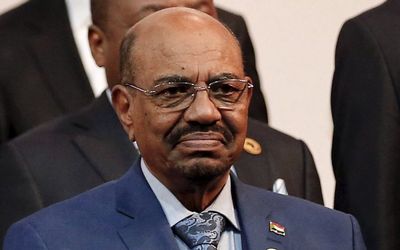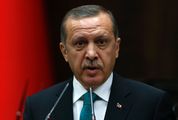THE government stuck to its position that it did not have a duty to arrest Sudanese president Omar al-Bashir, in the Supreme Court of Appeal on Friday, maintaining that Mr Bashir had immunity because he was a sitting head of state.
Mr Bashir is wanted by the International Criminal Court (ICC) for war crimes, crimes against humanity and genocide. The case before the appeal court will ultimately determine whether he, and other sitting heads of state accused of international crimes, will be able to visit SA in the future.
In June last year, SA was scandalised when Mr Bashir, who came to attend an African Union summit, spirited himself out of the country despite a court order that he not be allowed the leave. His departure led to a stern rebuke to the government by the judges of the Pretoria High Court and put the government on a collision course with the judiciary.
Arguments before a five-justice bench of the Bloemfontein court focused on the interpretation of two crucial statutes: the implementation of the Rome Statute of the International Criminal Court Act, which made part of South African law the convention that established the ICC, and the Diplomatic Immunities and Privileges Act.
The government’s counsel, Jeremy Gauntlett SC, said that the Immunities Act legislated the "age-old" rule of international customary law of total immunity from prosecution for a sitting head of state, unless immunity was waived or until he or she was no longer sitting.
He said this meant a temporary delay to prosecution but it did not mean impunity. The Implementation Act said to those accused of international crimes, "your day will come".
But Mr Gauntlett faced tough questions from the justices of the Supreme Court of Appeal, with Justice Carole Lewis saying Mr Gauntlett’s interpretation gave a "very, very, very limited meaning" to the Implementation Act.
Justice Lewis suggested that, on a reading of the two acts side by side, heads of state accused of international crimes did not get the benefit of the immunity. Otherwise, what was the point of the Rome Statute, she asked.
But Mr Gauntlett replied that if the Implementation Act meant to take away immunity from some sitting heads of state, it could "so easily" have said so. He said the Immunities Act, which came into force just a few months before the Implementation Act, was clear that Mr Bashir had immunity. He was still a head of state and Sudan had not waived his immunity.
Counsel for the Southern African Litigation Centre (Salc) — the organisation that went to court last year seeking his arrest — Wim Trengove SC, said this case was not about whether a South African court had the jurisdiction to arrest and prosecute Mr Bashir. The case was about SA’s duty to surrender him for prosecution in the ICC, which was an entirely different process, under section 10 the Implementation Act.
He said section 10 was clear and unambiguous and SA had a duty to co-operate in the surrender to the ICC of those wanted for international crimes. "It means what it says," he said.
Mr Trengove said Mr Gauntlett’s interpretation gave rise to an absurdity. It meant that only heads of state that had waived their immunity could be arrested. It also meant the court would have to change the obvious meaning of the statute.
Max du Plessis, also for Salc, said that even if customary international law did apply, it did not mean that sitting heads of state were immune. The law had moved on, he said, and there was now an exception to this principle for those who were wanted by an international tribunal.
Organisations applying to be friends of the court argued that the victims of the Darfur genocide were entitled in law to an effective remedy. Gcina Malindi SC, for African Centre For Justice and Peace Studies, and the International Refugee Rights Initiative had applied to submit new evidence before the Supreme Court of Appeal on continuing atrocities in Darfur and Sudan generally, but was refused.
Jason Brickhill for the Peace and Justice Initiative and the Centre for Human Rights said the Malabo Protocol, which would see an African version of the ICC, had yet to get enough ratifications to bring it into existence. Even if it were to get enough ratifications, it would exclude a prosecution of Mr Bashir because it was forward-looking only and would give immunity to sitting heads of state.
Judgment was reserved.

Omar al-Bashir. Picture: REUTERS/SIPHIWE SIBEKO
THE government stuck to its position that it did not have a duty to arrest Sudanese president Omar al-Bashir, in the Supreme Court of Appeal on Friday, maintaining that Mr Bashir had immunity because he was a sitting head of state.
Mr Bashir is wanted by the International Criminal Court (ICC) for war crimes, crimes against humanity and genocide. The case before the appeal court will ultimately determine whether he, and other sitting heads of state accused of international crimes, will be able to visit SA in the future.
In June last year, SA was scandalised when Mr Bashir, who came to attend an African Union summit, spirited himself out of the country despite a court order that he not be allowed the leave. His departure led to a stern rebuke to the government by the judges of the Pretoria High Court and put the government on a collision course with the judiciary.
Arguments before a five-justice bench of the Bloemfontein court focused on the interpretation of two crucial statutes: the implementation of the Rome Statute of the International Criminal Court Act, which made part of South African law the convention that established the ICC, and the Diplomatic Immunities and Privileges Act.
The government’s counsel, Jeremy Gauntlett SC, said that the Immunities Act legislated the "age-old" rule of international customary law of total immunity from prosecution for a sitting head of state, unless immunity was waived or until he or she was no longer sitting.
He said this meant a temporary delay to prosecution but it did not mean impunity. The Implementation Act said to those accused of international crimes, "your day will come".
But Mr Gauntlett faced tough questions from the justices of the Supreme Court of Appeal, with Justice Carole Lewis saying Mr Gauntlett’s interpretation gave a "very, very, very limited meaning" to the Implementation Act.
Justice Lewis suggested that, on a reading of the two acts side by side, heads of state accused of international crimes did not get the benefit of the immunity. Otherwise, what was the point of the Rome Statute, she asked.
But Mr Gauntlett replied that if the Implementation Act meant to take away immunity from some sitting heads of state, it could "so easily" have said so. He said the Immunities Act, which came into force just a few months before the Implementation Act, was clear that Mr Bashir had immunity. He was still a head of state and Sudan had not waived his immunity.
Counsel for the Southern African Litigation Centre (Salc) — the organisation that went to court last year seeking his arrest — Wim Trengove SC, said this case was not about whether a South African court had the jurisdiction to arrest and prosecute Mr Bashir. The case was about SA’s duty to surrender him for prosecution in the ICC, which was an entirely different process, under section 10 the Implementation Act.
He said section 10 was clear and unambiguous and SA had a duty to co-operate in the surrender to the ICC of those wanted for international crimes. "It means what it says," he said.
Mr Trengove said Mr Gauntlett’s interpretation gave rise to an absurdity. It meant that only heads of state that had waived their immunity could be arrested. It also meant the court would have to change the obvious meaning of the statute.
Max du Plessis, also for Salc, said that even if customary international law did apply, it did not mean that sitting heads of state were immune. The law had moved on, he said, and there was now an exception to this principle for those who were wanted by an international tribunal.
Organisations applying to be friends of the court argued that the victims of the Darfur genocide were entitled in law to an effective remedy. Gcina Malindi SC, for African Centre For Justice and Peace Studies, and the International Refugee Rights Initiative had applied to submit new evidence before the Supreme Court of Appeal on continuing atrocities in Darfur and Sudan generally, but was refused.
Jason Brickhill for the Peace and Justice Initiative and the Centre for Human Rights said the Malabo Protocol, which would see an African version of the ICC, had yet to get enough ratifications to bring it into existence. Even if it were to get enough ratifications, it would exclude a prosecution of Mr Bashir because it was forward-looking only and would give immunity to sitting heads of state.
Judgment was reserved.





















Change: 0.86%
Change: 1.06%
Change: 1.36%
Change: 0.99%
Change: 0.00%
Data supplied by Profile Data
Change: 0.34%
Change: 0.90%
Change: 0.86%
Change: 0.00%
Change: 0.66%
Data supplied by Profile Data
Change: 1.29%
Change: 0.59%
Change: 0.23%
Change: 0.44%
Change: 0.35%
Data supplied by Profile Data
Change: -0.58%
Change: -0.81%
Change: 0.31%
Change: 0.00%
Change: 2.13%
Data supplied by Profile Data